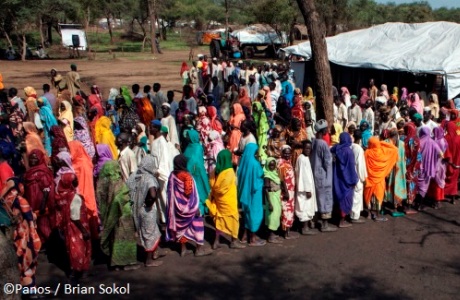South Sudan Crisis, Ireland Announces Humanitarian Funding
11/2/15
6.5 million of the South Sudan population are at risk of not being able to feed themselves and 2.5 million people are facing dire hunger.
Minister Seán Sherlock has announced that the Government will contribute €3 million to provide food, medicines, education and vital supplies to thousands of displaced families in South Sudan, who have fled the ongoing conflict.
Widespread violence from South Sudan’s civil war has forced almost 2 million people to flee their homes, the majority of whom have been internally displaced, with almost half a million living as refugees in neighbouring countries.
Widespread violence from South Sudan's civil war has forced almost 2 million people to flee their homes.
More than a year after the outbreak of conflict in South Sudan, the political situation remains fragile and the humanitarian outlook is grim, with millions suffering from hunger, starvation, violence, and disease.
Announcing the funding, which is drawn from Irish Aid’s humanitarian budget, Minister Seán Sherlock said:
“The world’s youngest country stands on the brink of famine and the needs of refugees and host communities in the region continue to increase. Almost 6.5 million people are at risk of not being able to feed themselves and 2.5 million people are facing dire hunger right now.”
200,000 South Sudanese refugees fleeing the conflict have sheltered in camps in the Gambella region of western Ethiopia, the vast majority of whom are women and children, often malnourished and in poor health.
200,000 South Sudan refugees fleeing the conflict have sheltered in camps in the Gambella region of western Ethiopia.
Recalling his visit to Gambella with President Higgins last November, Minister Sherlock said:
“I saw for myself the devastating impact of the crisis. It is vital that we keep global attention on this severe humanitarian crisis and its impact on the region. Ireland is working hard to support our UN and NGO partners on the ground to protect vulnerable women and children, and to meet their food, nutrition and health needs.”
The funding of €3 million is being provided to the United Nations Common Humanitarian Fund for South Sudan, which plays a key role in providing fast, flexible funding to a wide range of partners, including the World Food Programme, the World Health Organisation, UNICEF, and NGOs to continue their life-saving work.
Members of Ireland’s Rapid Response Corps, a register of highly skilled individuals who deploy at short notice to assist in emergency relief efforts, are currently deployed to South Sudan, working with the United Nations Children’s Fund (UNICEF) in Juba; with the UN Office for the Coordination of Humanitarian Affairs (OCHA) and the UN High Commissioner for Refugees (UNHCR) in the Gambella refugee camps.
Minister Seán Sherlock has announced that the Government will contribute €3 million to provide food, medicines, education and vital supplies to thousands of displaced families in South Sudan, who have fled the ongoing conflict.
Widespread violence from South Sudan’s civil war has forced almost 2 million people to flee their homes, the majority of whom have been internally displaced, with almost half a million living as refugees in neighbouring countries.
More than a year after the outbreak of conflict in South Sudan, the political situation remains fragile and the humanitarian outlook is grim, with millions suffering from hunger, starvation, violence, and disease.
Announcing the funding, which is drawn from Irish Aid’s humanitarian budget, Minister Seán Sherlock said:
“The world’s youngest country stands on the brink of famine and the needs of refugees and host communities in the region continue to increase. Almost 6.5 million people are at risk of not being able to feed themselves and 2.5 million people are facing dire hunger right now.”
200,000 South Sudanese refugees fleeing the conflict have sheltered in camps in the Gambella region of western Ethiopia, the vast majority of whom are women and children, often malnourished and in poor health.
Recalling his visit to Gambella with President Higgins last November, Minister Sherlock said:
“I saw for myself the devastating impact of the crisis. It is vital that we keep global attention on this severe humanitarian crisis and its impact on the region. Ireland is working hard to support our UN and NGO partners on the ground to protect vulnerable women and children, and to meet their food, nutrition and health needs.”
The funding of €3 million is being provided to the United Nations Common Humanitarian Fund for South Sudan, which plays a key role in providing fast, flexible funding to a wide range of partners, including the World Food Programme, the World Health Organisation, UNICEF, and NGOs to continue their life-saving work.
Members of Ireland’s Rapid Response Corps, a register of highly skilled individuals who deploy at short notice to assist in emergency relief efforts, are currently deployed to South Sudan, working with the United Nations Children’s Fund (UNICEF) in Juba; with the UN Office for the Coordination of Humanitarian Affairs (OCHA) and the UN High Commissioner for Refugees (UNHCR) in the Gambella refugee camps.

